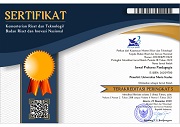Bagaimana Self-Regulated Learning pada Calon Guru Matematika?
Abstract
Self-regulated learning can be explained as a state of learners actively and organized involved in monitoring and regulating cognition and behavior during the learning process, which affects the achievement of learning goals. Self-regulated learning ability is essential for students to achieve optimal academic performance. The research used was a survey using quantitative methods involving 103 prospective mathematics teachers. Data were collected using the self-regulated learning scale developed by Purdie et al. which identified ten dimensions of self-regulated learning, namely self-evaluation, organizing and transforming, goal setting and planning, seeking information, keeping records and monitoring, environmental structuring, self-consequences, rehearsing and memorizing, seeking social assistance and reviewing records. The results of this study indicate that prospective mathematics teachers have moderate self-regulated learning. This research is used as a basis for efforts to improve self-regulated learning in the scope of Guidance and Counseling.
Keywords
Teks Lengkap:
1-6Referensi
Anthonysamy, Lilian and Koo, Ah Choo and Hew, Soon Hin (2021) Investigating self-regulated learning strategies for digital learning relevancy. Malaysian Journal of Learning and Instruction (MJLI), 18 (1). pp. 29-64. ISSN 1675-811 Bozkurt, A., Akgün-Ozbek, E., & Zawacki-Richter, O. (2017). Trends and patterns in massive open online courses: Review and content analysis of research on MOOCs (2008-2015). International Review of Research in Open and Distance Learning, 18(5), 118–147. Gambo, Y., & Shakir, M. Z. (2021). Review On Self-Regulated Learning In Smart Learning Environment. In Smart Learning Environments. https://doi.org/10.1186/s40561-021- 00157-8 Handayani, S., & Sholikhah, N. (2021). Pengaruh Antara Self Efficacy Dan Self Regulated Learning Terhadap Prestasi Belajar Mahasiswa Selama Pembelajaran Daring. Edukatif : Jurnal Ilmu Pendidikan, 3(4), 1373–1382. Jansen, R. S., van Leeuwen, A., Janssen, J., Jak, S., & Kester, L. (2019). Self-regulated Learning Partially Mediates The Effect Of Self-regulated Learning Interventions On Achievement In Higher Education: A Meta-Analysis. In Educational Research Review. https://doi.org/10.1016/j.edurev.2019.100292 Jaramillo, Andrés, Juan Pablo Salinas-cerda, and Paula Fuentes. 2022. “Self-Regulated Learning and Academic Performance in Chilean University Students in Virtual Mode During the Pandemic: Effect of the 4Planning App.” Frontiers in Education 13(May):1–10. doi: 10.3389/fpsyg.2022.890395. Krzensk, A. (2020). Influencing academic resilience and self-regulation in students: An intervention in Mathematics. Lestari, S. M. P., Supriyati, Farich, A., & Lestari, B. I. (2022). Hubungan motivasi belajar dengan self regulated learning (SRL) pada masa pandemi covid-19 pada mahasiswa kedokteran Universitas Malahayati angkatan 2019. Guidance: Jurnal Bimbingan Dan Konseling, 19(1), 89–98. Nückles, M., Roelle, J., Glogger-Frey, I., Waldeyer, J., & Renkl, A. (2020). The self-regulation-view in writing-to-learn: Using journal writing to optimize cognitive load in self-regulated learning. Educational Psychology Review, 32, 1089-1126 Panadero, E. (2017). A review of self-regulated learning: Six models and four directions for research. Frontiers in Psychology, 8(1), 1–28. Santrock, John. W. (2014). Psikologi Pendidikan (Edisi Kedua). Terjemahan Tri Wibowo, Jakarta: Prenada Media Group Schunk, D. H. & Greene, J. A. (2018). Historical, Contemporary, and Future Perspectives on Self-Regulated Learning and Performance. In D. H. Schunk & J. A. Greene (Eds). Handbook of Self-Regulation of Learning and Performance, 2nd Edition. New York: Routledge Zheng, L. 2016. The effectiveness of self-regulated learning scaffolds on academic performance in computer-based learning environments: A meta-analysis. Asia Pacific Education Review, 17(2), 187–202. Zimmerman, B. J. (1989). A Social Cognitive View of Self-Regulated Academic Learning. Journal of Educational Psychology, Vol 81, 329-339. Zimmerman, B. J., & Martinez-Pons, M. (1990). Construct validation of a strategy of Strategy Model of Student Self-Regulated Learning. Journal of Educational Psychology, Vol. 80, 284-290 Zimmerman, B. J. (2000). Attaining self-regulation: A social cognitive perspective. In Handbook of selfregulation (pp. 13-39): Elsevier. Zimmerman, B.J. (2002). Becoming a Self-Regulated Learner: An Overview. Theory Into Practice, Volume 41, Number 2, 64-70. Zimmerman, B. J., & Schunk, D. H. (Eds.). (2012). Self-regulated learning and academic achievement: Theory, research, and practice. Springer Science & Business Media Zimmerman, B. J. (2013). From Cognitive Modeling to Self-Regulation: A Social Cognitive Career Path. Educational Psychologist, 48(3), 135–147. https://doi.org/10.1080/00461520.2013.794676 Zunaidi, A., Fatmawatie, N., Natalina, S. A., & Mushlihin, I. A. (2021). Penguatan Pemahaman dan Orientasi Kurikulum Kampus Merdeka dalam Menyambut Merdeka Belajar-Kampus Merdeka. Batuah: Jurnal Pengabdian kepada Masyarakat, 1(2), 1-7
DOI: https://doi.org/10.24176/jpp.v7i1.12790
Article Metrics
Refbacks
- Saat ini tidak ada refbacks.

This work is licensed under a Creative Commons Attribution-NonCommercial-ShareAlike 4.0 International License.
Jurnal Prakarsa Paedagogia Status
Negara Asal Pengunjung:
Jurnal Prakarsa Paedagogia dari Fakultas Keguruan dan Ilmu Pendidikan Universitas Muria Kudus is licensed under a Creative Commons Attribution 3.0 International License.
Dedicated to:







